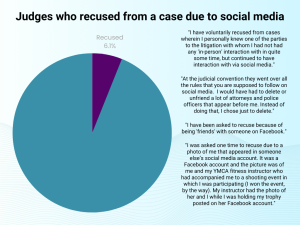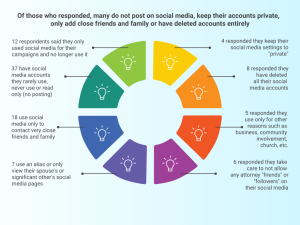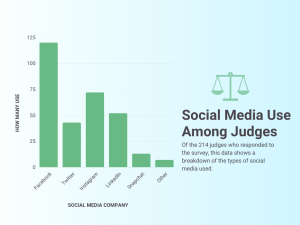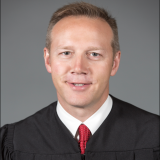Oklahoma Bar Journal
Judges on Social Media
How Judges Navigate Their Use of Social Media
By Judge Thad Balkman

stock.adobe.com | Stanisic Vladimir | #308132399
Judges, like most other people, join and use social media platforms to share memories and photos, keep up with the news and generally stay connected with others. Given the solitary nature of the profession, many judges enjoy interacting with others through Facebook, Instagram, Snapchat, Twitter, LinkedIn and other platforms. Social media, particularly Facebook, can also be a useful tool for campaigning. Judges’ use of social media for their campaigns will be addressed further below. I recently conducted a short survey of all district court and appellate judges in Oklahoma and found that more than 75% of judges who responded have some type of social media account, where Facebook is the most common and is used by about 70%.[1] Many of those judges who use social media reported feeling it is a way for them to connect with others and combat feelings of isolation.
As depicted in the 2011 Academy Award for Best Picture nominee, The Social Network, Facebook has evolved from its early days as an online photo directory used by college students at Harvard University to “judge attractiveness of fellow students” to a social network of just under three billion users, the largest social network in the world.[2] Today, Facebook is commonly used by churches, schools and numerous other groups and organizations to post announcements; Facebook is used by businesses to promote sales and has a marketplace for online sales by businesses and individuals; Facebook serves as a master calendar to help its users keep track of birthdays, anniversaries and community events; Facebook Messenger is used for direct communications between friends; and Facebook functions as a news source similar to Twitter, TikTok and other social media platforms.
Judges who are most active on social media, like lawyers and most other social media users, derive satisfaction and joy from sharing content like their children’s accomplishments, travel adventures or maybe even pictures of their gourmet dinners with other users. However, many Oklahoma judges with social media accounts reported they are passive users and rarely, if ever, post any content and refrain from leaving comments or likes, choosing instead to restrict their use to reading others’ posts and the occasional “Happy Birthday” greeting.[3]
 2011 JUDICIAL ETHICS ADVISORY PANEL OPINION
2011 JUDICIAL ETHICS ADVISORY PANEL OPINION
The limited social media participation by Oklahoma judges may be attributed to a 2011 opinion by the Oklahoma Judicial Ethics Advisory Panel. The three-member panel unanimously agreed that the use of social media sites by judges is “fraught with peril.”[4] They acknowledged that a judge may “hold an internet social account, such as Facebook, Twitter, or LinkedIn without violating the Code of Judicial Conduct” but placed restrictions on such use.[5] The panel’s opinion places restrictions on judges’ social media “friends.” Presumably, these restrictions would apply to “friends” on Facebook, “followers” on Instagram and Twitter, as well as any other connections on various social media platforms. The panel opined that a social media account of a judge can only include “‘friends’ ... who do[ ] not regularly appear in the Judge’s court.”[6] This would exclude any “law enforcement officers, social workers, attorneys and others who may appear in his or her court” from this “friends” list.[7]
The panel cited similar judicial ethics opinions reached in other states, including New York, Florida, South Carolina, Kentucky and Ohio, that found an inherent conflict between a judge's use of social media and their judicial duties. The panel’s reasoning for its strict limitation is based on the belief that judges should have minimal interaction with social media to avoid an appearance of impropriety. The panel, referring to the preamble of the Oklahoma Code of Judicial Conduct, stated that judges have a duty to “maintain the dignity of judicial office at all times, avoid impropriety and the appearance of impropriety in their professional and personal lives, and to ensure the greatest public confidence in their independence, impartiality, integrity and competence.”[8]
The panel articulated a test for the appearance of impropriety rooted in Canon 1, Rule 214(C) for determining whether a judge's use of social media violates the Judicial Code of Conduct. That rule stated, "A Judge shall not convey or permit others to convey the impression that any person or organization is in a position to influence the Judge."[9] “The test for appearance of impropriety is whether the conduct would create in reasonable minds a perception that the Judge violated this code or engaged in other conduct that reflects adversely on the Judge's honesty, impartiality, temperament, or fitness to serve as a Judge.”[10]
The Oklahoma Supreme Court has adopted the more stringent approach articulated by the panel in decisions disqualifying judges who were “friends” with a litigant or attorney on Facebook. For example, a judge presiding over a divorce case was asked to be recused by one of the parties because the judge was a Facebook friend of the complaining party’s spouse. The trial court denied the motion to disqualify the judge, finding that the judge and the litigant were not actually friends. The judge had thousands of Facebook friends and accepted all Facebook friend requests. Using the impropriety test, the trial court found that an objective observer would not reasonably question the judge’s impartiality because the judge and the litigant’s spouse had a Facebook friendship; that relationship alone was not close enough to influence the judge’s ability to remain impartial. The Oklahoma Supreme Court disqualified the judge in an unpublished decision.[11]
EVOLVING SOCIAL MEDIA STANDARDS IN OTHER STATES
The stringent social media policy adopted in Oklahoma is based on decisions in other states, including Florida's Judicial Ethics Advisory Opinion 2009-20 that “prohibits a Judge from adding lawyers who appear in the Judge's court as ‘friends’ ... as being violative of the canon.”[12] The panel extended the restriction to “social workers, law enforcement officers, or others who regularly appear in court in an adversarial role.”[13] One notable difference is in Florida’s opinion court: Staff were prohibited to be added as “friends,” and Oklahoma’s does not extend that prohibition.[14]
However, that Florida opinion was subsequently reversed in 2018 by the Florida Supreme Court. The case involved a party to a lawsuit who sought a judge’s disqualification based on her Facebook friendship with an attorney who represented a potential party in the pending litigation. The trial court denied the motion to disqualify, and on appeal, the 3rd District Court of Appeal found that a Facebook friendship alone does not prove a close relationship between the parties and, as a result, affirmed the trial court’s decision to deny the motion. This decision caused a split in Florida’s District Courts of Appeal, so the Florida Supreme Court reviewed the issue in Law Offices of Herssein and Herssein, P.A. v. United Services Automobile Association.[15]
The Florida Supreme Court upheld the decision of the 3rd District Court of Appeal to deny the disqualification motion and rejected the Florida Judicial Ethics Advisory Opinion Committee’s bright-line rule of disqualification. The Florida Supreme Court went as far as to criticize the committee for misunderstanding the “intrinsic nature of Facebook 'friendship’” and placing too much focus on a Facebook “friendship” without considering other factors in evaluating the relationship between a judge and attorney or litigant.[16]
The court agreed with the intermediate appellate court’s findings that judges may have hundreds of Facebook friends, ranging from old high school classmates to close, present-day friends, and “Facebook members often cannot recall every person they have accepted as ‘friends’ or who have accepted them as ‘friends.’”[17] The Supreme Court concluded, “No reasonably prudent person would fear that she could not receive a fair and impartial trial based solely on the fact that a judge and attorney appearing before the judge are Facebook ‘friends’ with a relationship of indeterminate nature.”[18] The court noted that just as there are different degrees of traditional friendships varying in closeness, “the establishment of a Facebook ‘friendship’ does not objectively signal the existence of the affection and esteem involved in a traditional ‘friendship.’”[19] In the context of a motion for disqualification, unless there are specific facts tending to show a particular friendship is close in nature, “the mere existence of a Facebook ‘friendship,’ in and of itself, does not inherently reveal the degree or intensity of the relationship between the Facebook ‘friends.’”[20] The Florida decision is consistent with the majority of states that recognize that not all social media connections signify a close relationship.[21]
 Oklahoma’s rule discouraging judges from using Facebook is presently shared by a minority of other states.[22] The majority of states reject a bright-line rule of disqualification based solely on the existence of a friendship or virtual connection. Instead, they take a more permissive approach to judges using social media; judges may use social media but are encouraged to disclose to the litigants if they are friends or have some other social media relationship that is reasonably relevant to a possible motion for disqualification. Because these “interpersonal relationships are varied, fact-dependent, and unique to the individuals involved[,] ... judges [ ] ultimately must determine the nature of their own specific relationships with particular individuals and their ethical obligations resulting from those relationships.”[23] This approach recognizes that there is nothing inherently inappropriate about a judge making use of a social network. However, even in states with much more lenient opinions on the use of social media by judges, advisory panels and courts recommend that judges exercise caution and avoid social media connections that may create an appearance of bias or impropriety.
Oklahoma’s rule discouraging judges from using Facebook is presently shared by a minority of other states.[22] The majority of states reject a bright-line rule of disqualification based solely on the existence of a friendship or virtual connection. Instead, they take a more permissive approach to judges using social media; judges may use social media but are encouraged to disclose to the litigants if they are friends or have some other social media relationship that is reasonably relevant to a possible motion for disqualification. Because these “interpersonal relationships are varied, fact-dependent, and unique to the individuals involved[,] ... judges [ ] ultimately must determine the nature of their own specific relationships with particular individuals and their ethical obligations resulting from those relationships.”[23] This approach recognizes that there is nothing inherently inappropriate about a judge making use of a social network. However, even in states with much more lenient opinions on the use of social media by judges, advisory panels and courts recommend that judges exercise caution and avoid social media connections that may create an appearance of bias or impropriety.
CODE OF JUDICIAL CONDUCT OKLAHOMA RULE 2.11
Oklahoma’s Code of Judicial Conduct contains canons and rules that should guide a judge in determining what is appropriate use of social media. The preamble states, “Inherent in all the Rules contained in this Code are the precepts that judges, individually and collectively, must respect and honor the judicial office as a public trust and strive to maintain and enhance confidence in the legal system.”[24]
For this reason, the Code of Judicial Conduct requires judges to “uphold and promote the independence, integrity, and impartiality of the judiciary” and “avoid impropriety and the appearance of impropriety.”[25] And pursuant to Rule 2.11 of the code, a judge is required to disqualify “himself or herself in any proceeding in which the judge's impartiality might reasonably be questioned,” including cases where the “judge has a personal bias or prejudice concerning a party or a party's lawyer.”[26] “Judges must apply extra caution when using social media because their online activity may be easily misconstrued or create an appearance of partiality requiring disqualification.”[27]
These principles of avoiding impropriety, or the appearance of impropriety, and remaining impartial should be the touchstone for judges considering whether their use of social media is appropriate. As social media becomes more pervasive in our society, judges must be able to discern what is and what is not proper social media usage. The Code of Judicial Conduct puts judges on notice that they must exercise caution in their use of social media: “A judge should expect to be the subject of public scrutiny that might be viewed as burdensome if applied to other citizens, and must accept the restrictions imposed by the Code.”[28]
EXAMPLES OF JUDICIAL MISUSE OF SOCIAL MEDIA
Unfortunately, there are many examples of judges across the nation whose social media use has raised ethical concerns and has run afoul of the proper conduct expected of judges. These are some of the more recent noteworthy examples:
- A Tennessee judge was publicly reprimanded for giving online advice via Facebook on how to avoid arrests for shoplifting. He said his tongue-in-cheek tips on stealthy behavior and how *not* to hide the loot were meant to be entertaining and make people reflect on their choices. The commission reviewing his behavior determined it was neither dignified nor appropriate for a judge, especially one who hears criminal cases.[29]
- A South Carolina probate judge who had previously been suspended for problematic social media posts was once again suspended (this time for 18 months) in part for solicitation of hurricane relief donations as a birthday fundraiser via Facebook on a page that identified him as a judge. In connection with his prior discipline, he had promised to both refrain from making political or fundraising posts and remove references to his judicial role.[30]
- The California Commission on Judicial Performance publicly admonished a judge for activity in a Facebook group and on Twitter in connection with efforts to recall a district attorney. The commission found that his online activity (and it was genuine activity, not passive membership in groups or just following pages) suggested bias against certain groups of people.[31]
- The New York State Commission on Judicial Conduct admonished a judge for publicly displaying on his Facebook page two photographs of himself wearing a county sheriff’s uniform (taken after he retired from law enforcement) and his personal comments expressing his appreciation for law enforcement officers and also describing his appearance at an event supporting law enforcement. The judge recognized that those viewing his posts and seeing him in a law enforcement uniform would reasonably question his ability to be impartial in cases involving law enforcement and took full responsibility for his actions.[32]
- The Tennessee Board of Judicial Conduct reprimanded a judge for messages sent to multiple women on social media platforms over a period of several years, ranging from flirtatious to overtly sexual in nature, most of which depicted him in his judicial robe. The judge acknowledged that this conduct was beneath the dignity of the judicial office.[33]
- After posting links to anti-Semitic and anti-Muslim articles on his Facebook account, a Tennessee judge was reprimanded.[34] Other Facebook posts made by the judge stated, “Democrats won in the 2018 midterms by getting illegal aliens to vote,” and another claimed, “Illegal immigrants are responsible for a large number of crimes.”[35] These posts were deemed partisan in nature and a violation of the Code of Judicial Conduct.[36]
- The Nevada Commission on Judicial Discipline publicly reprimanded a municipal court judge for using a photoshopped image and signature of Dwayne Johnson, aka “The Rock,” in an endorsement ad on her campaign’s Facebook page. The ad featured the judge in her robe next to the image of “The Rock.” She also commented, “I’m ‘almost’ taller than him. Almost.” The judge knew her campaign consultant had not received permission from Mr. Johnson when it was posted. She had the ad and her comment taken down the following day.[37]
- A Tennessee judge was publicly reprimanded and determined to have abused the prestige of her office by soliciting school donations on Facebook while wearing her judicial robe.[38]
- A Georgia judge faced numerous complaints related to her use of Instagram, Twitter and Cash App, including soliciting money donations for her birthday, offering relationship advice and making restaurant recommendations – all while a candidate for judge.[39]
NAVIGATING PROPER USE OF SOCIAL MEDIA MOVING FORWARD
So long as the 2011 Oklahoma panel opinion remains, judges must exercise great caution when using social media. A judge’s duty to maintain impartiality and avoid any appearance of bias means that judges must be selective in choosing their Facebook friends and other social media contacts, and judges should not publicly express their opinions on controversial issues. A simple screen tap signifying that you like, heart, follow or even view a social media post can easily be translated to mean approval of that post and implicate a real or perceived bias.
A secondary concern with judges using social media is that it can compromise the confidentiality of ongoing cases. A careless judge may inadvertently reveal details about cases they are presiding over, which can lead to mistrials or appeals. Social media use may also expose judges to security risks, including cyberstalking, harassment and exposure to a judge’s children and loved ones.[40]
Additionally, the American Bar Association has published a guide for judges on social media use, which includes recommendations for avoiding the appearance of bias or impropriety.[41]
My survey of Oklahoma judges found that the most common use of Facebook by judges was for their campaigns. Facebook pages, rather than personal accounts, are created by judges to reach out to voters. The page feature allows a judicial candidate to advertise and measure the effectiveness of the content on that page. An entire industry has sprouted up in recent years catering to political candidates and helping them target their social media advertising to select voters. Because it is cost-effective, many candidates for local office, including judges, are spending more money on social media than advertising on traditional media platforms like radio and newspapers. Judges who use Facebook for campaigns report that once their campaign is over, they delete or deactivate their Facebook page.
The panel summed up the best advice for judges who decide to use social media; restating admonitions from Kentucky and New York judicial advisory opinions, the Oklahoma panel advises, "Social networking sites are fraught with peril for Judges. We agree wholeheartedly with the admonition.”[42]
 OKLAHOMA SUPREME COURT SOCIAL MEDIA STATEMENT
OKLAHOMA SUPREME COURT SOCIAL MEDIA STATEMENT
Former Oklahoma Supreme Court Chief Justice Noma Gurich issued a social media statement in 2019 to all members of the Oklahoma judiciary and court employees. Her statement is a practical and succinct tool to guide the judiciary in the proper use of social media.
Remember to be mindful in your use of personal social media. You must remember that anyone and everyone in the public is a potential audience of your postings. Your use of social media may raise ethical, security and privacy concerns. As judges and court support personnel, we must consider the impact of our statements on the public.
We must avoid the perception of showing favoritism toward any litigants or parties. We should not engage in political discussion or otherwise make negative comments about the other branches of government. We want to gain the trust and respect of the public. Likewise, we must show respect.
Please remember that our non-partisan system of selecting judges was adopted at a time of great public mistrust of our state judicial system. We must be cautious in any public comment which suggests we no longer value our non-partisan status. Help all of us maintain high ideals.
Thank you for your continued hard work and service to all communities in Oklahoma. Think before you post. You are the face of the judiciary.[43]
Until such time that the panel reconsiders its opinion or the Oklahoma Supreme Court adopts the majority position allowing more flexible use of Facebook and other social media platforms, judges who decide to use social media to communicate and connect with others are wise to remember that less is best. Avoid liking, retweeting and commenting on others’ posts; if you must, exercise great caution. In choosing who you friend or follow or what groups to join, remember to “aspire at all times to conduct that ensures the greatest public confidence.”[44] Use privacy settings to control who sees your account and your posts. And remember that everything a judge posts on social media is a reflection of not just the judge but also of the judicial system. Use social media to build confidence in the rule of law and the judiciary.
Author’s Note: The author thanks the Oklahoma Bar Journal Board of Editors Chair Melissa DeLacerda for her solicitation and support of this article.
 ABOUT THE AUTHOR
ABOUT THE AUTHOR
Judge Thad Balkman was appointed district judge for the 21st Judicial District (Cleveland County) in 2013. Judge Balkman currently serves as presiding judge of the Oklahoma Court on the Judiciary, Trial Division, and chairman of the Rules of Professional Responsibility Committee. He has been the president of the Oklahoma Judges Association since 2018, and he is the past president of the Oklahoma Judicial Conference. He is a member of the Uniform Law Commission.
ENDNOTES
[1] Survey by Thad Balkman of Oklahoma judges “Your Experience with Social Media” (May 23, 2023).
[2] Britannica, https://www.britannica.com/topic/Facebook (last visited June 2, 2023).
[3] Survey “Your Experience with Social Media,” supra note 1.
[4] Okla. Jud. Ethics Advisory Panel, Formal Op. 11-3, ¶7 (2011).
[5] Id. ¶¶1, 3.
[6] Id. ¶7.
[7] Id. ¶2.
[8] Id. ¶6.
[9] Id.
[10] Id.
[11] Mandamus, Clark v. Sullivan, FD-2017-38, No. MA-115029, (Okla. Order No. 116, 029 granted June 20, 2017).
[12] Okla. Jud. Ethics Advisory Panel, Formal Op. 11-3, ¶7.
[13] Id.
[14] Id. at ¶8.
[15] 271 So. 3d 889 (Fla. 2018).
[16] Id. at 898-99.
[17] Id. at 892.
[18] Id. at 897.
[19] Id. at 896.
[20] Id. at 897.
[21] See also McGaha v. Commonwealth, 414 S.W.3d 1, 6 (Ky. 2013) (“It is now common knowledge that merely being friends on Facebook does not, per se, establish a close relationship”), Kirby v. Wash. State Dep’t. of Emp. Sec., No. 70738-8-I, 214 WL7339610, at *1 (Wash Ct. App. Dec. 22, 2014) (“The words ‘post,’ ‘friend,’ and ‘friending’ used in the [Facebook] context merely refer to individuals communicating with those listed on a social networking website and do[ ] not, necessarily, imply any more significant relationship between those individuals.”)
[22] Florida, Massachusetts and Oklahoma take a “strict approach.” California, Arizona, Utah, Texas, North Carolina and Florida take a “moderate approach.” Maryland, New York, Kentucky, Ohio, South Carolina, Georgia and Tennessee have taken a more “liberal approach.” Shaziah Singh, “Friend Request Denied: Judicial Ethics and Social Media,” 7 Case W. Reserve J.L. Tech. & the Internet 153, 167 (2016).
[23] N.Y. Jud. Ethics Comm., Formal Op. 13-39, ¶3 (2013) (“the mere status of being ‘Facebook friend,’ without more, is an insufficient basis to require recusal”).
[24] Okla. Stat. tit. 5 app. 4, §Preamble (OSCN 2023) (Code of Judicial Conduct).
[25] Id. §Canon 1.
[26] Id. §Rule 2.11(A)(1).
[27] See In re Disqualification of Kerenyi, 2020-Ohio-1082, 160 Ohio St. 3d 1201, 1203, 153 N.E.3d 121, 123.
[28] Okla. Stat. tit. 5 app. 4, §Rule 1.2 cmt. [2].
[29] See In re Webb, File No. B21-8602 and B21-8654, Tenn. Bd. of Jud. Conduct (Nov. 5, 2021) (Letter of Reprimand to Judge Gerald Webb).
[30] See In re Johns, Opinion No. 28064 (S.C. Oct. 13, 2021).
[31] See In re O’Gara, Cal. Comm. on Jud. Performance Decision and Ord. Imposing Pub. Admonishment (Sept. 14, 2021).
[32] See In re Peck, N.Y. Comm. on Jud. Conduct (March 19, 2021).
[33] See In re Young, File No. B20-8220, Tenn. Bd. of Jud. Conduct (Oct. 5, 2020).
[34] See In re Lammey, File No(s). B19-7753 and B19-7777, Tenn. Bd. of Jud. Conduct (Letter of reprimand).
[35] https://www.actionnews5.com/2019/05/01/latino-memphis-plans-file-complaint-after-shelby-county-judge-posts-anti-immigration-views-facebook/?_ga=2.170316008.935866215.1689359731-1250254754.1689359731 (last accessed July 14, 2023).
[36] See In re Lammey, File No(s). B19-7753 and B19-7777, Tenn. Bd. of Jud. Conduct (Letter of reprimand).
[37] See In re Almase, 2017-099-P, Nev. Comm. on Jud. Discipline (Oct. 22, 2018).
[38] See In re Boyd, File No. B22-9105, Tenn. Bd. of Jud. Conduct (May 8, 2023).
[39] See In re Peterson, File No(s). 220-280, 2020-316, 2020-317, 2020-525, 2021-017, Jud. Qualifications Comm. (Ga. July 22, 2021).
[40] Peter M. Reyes Jr., “To Post or Not to Post: Judges on Social Media,” Summer 2019 ABA The Judges’ Journal.
[41] John G. Browning, “When All That Twitters Is Not Told: Ethical Risks in Judicial Use of Social Media,” Fall 2021 ABA The Judges’ Journal.
[42] Okla. Jud. Ethics Advisory Panel, Formal Op. 11-3, ¶7 (2011).
[43] Social Statement from the Chief Justice, Noma D. Gurich, Supreme Court of Oklahoma (November 2019).
[44] Okla. Stat. tit. 5 app. 4, §Preamble [2] (OSCN 2023), Appendix 4 – Code of Judicial Conduct.
Originally published in the Oklahoma Bar Journal – OBJ 95 Vol 6 (August 2023)
Statements or opinions expressed in the Oklahoma Bar Journal are those of the authors and do not necessarily reflect those of the Oklahoma Bar Association, its officers, Board of Governors, Board of Editors or staff.
